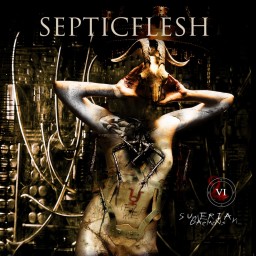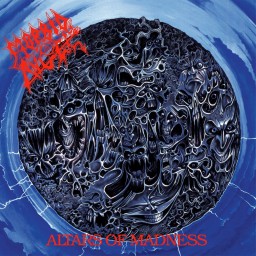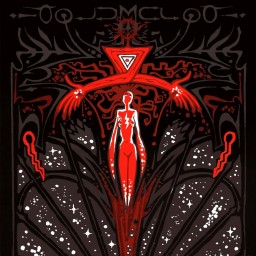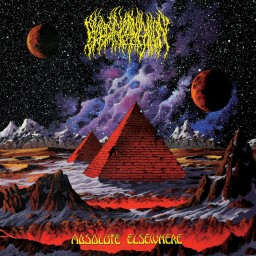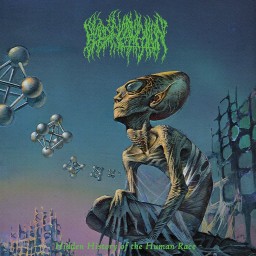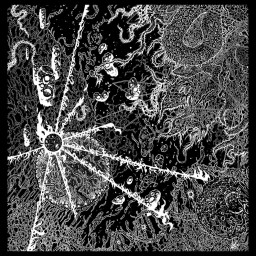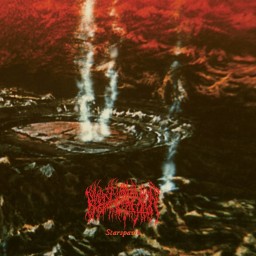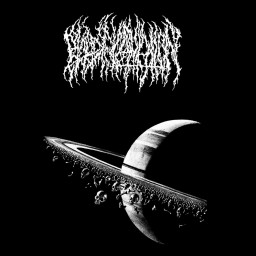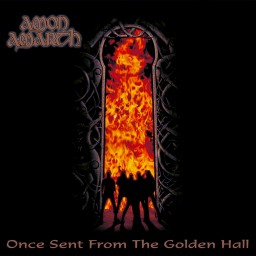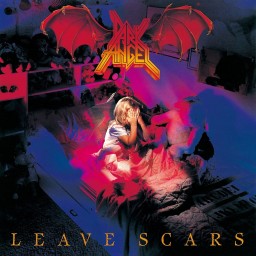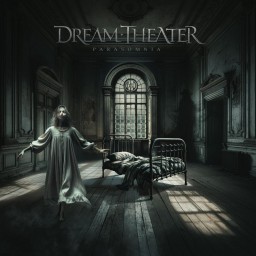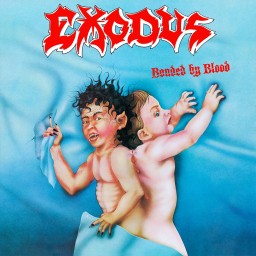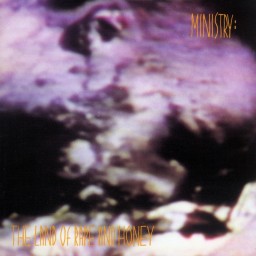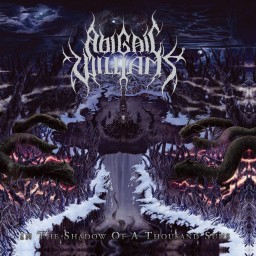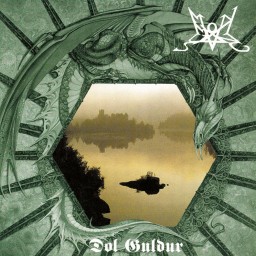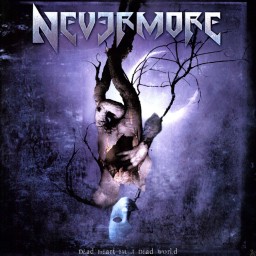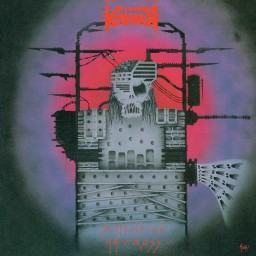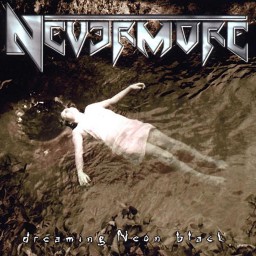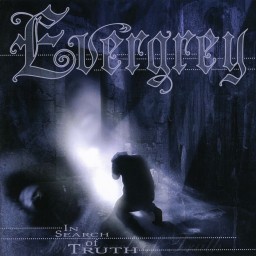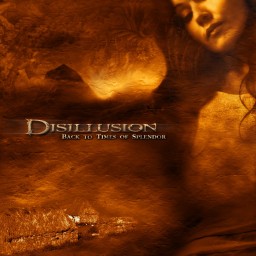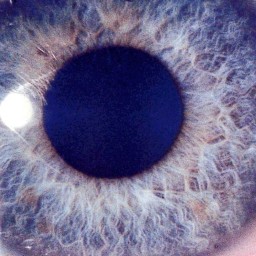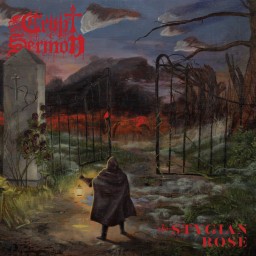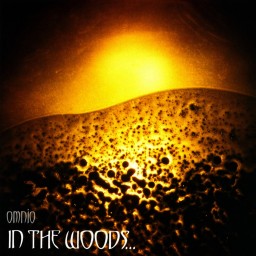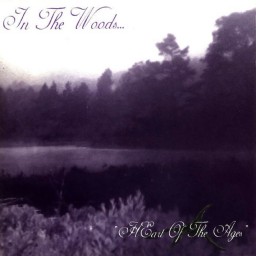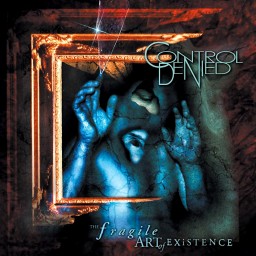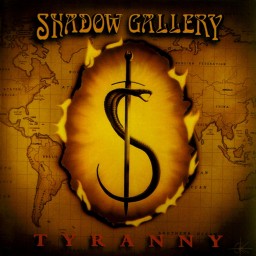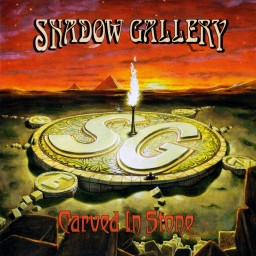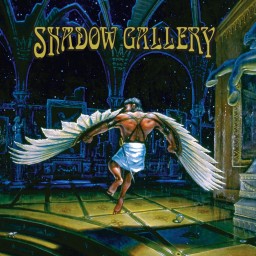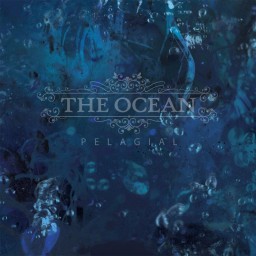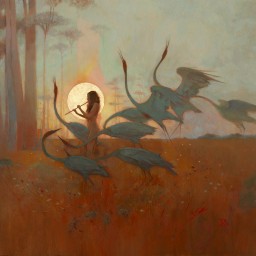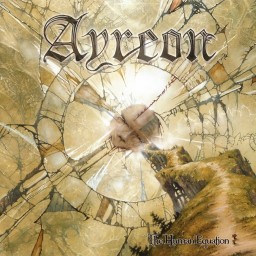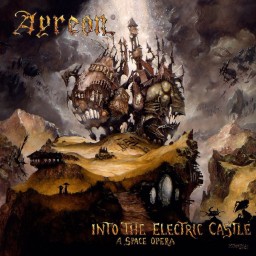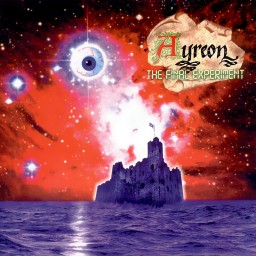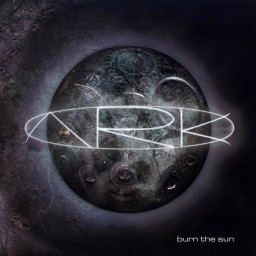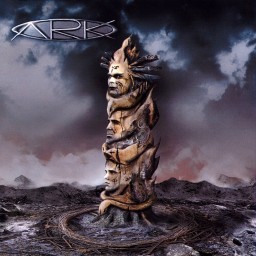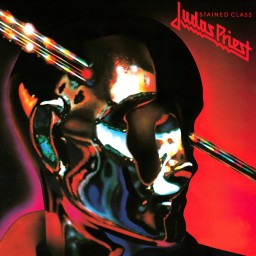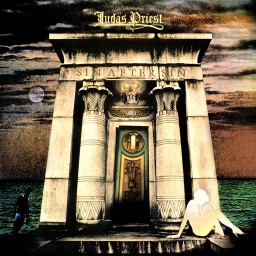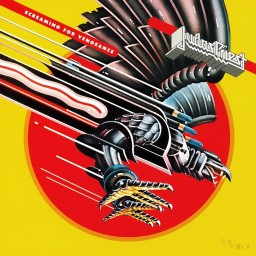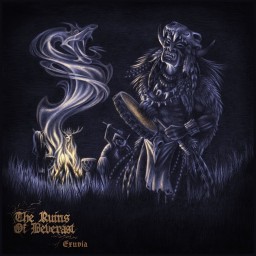Rexorcist's Reviews
Believe it or not, during my original Septicflesh marathon, I didn't get through this. I was more interested in the directly symphonic stuff. And even though Iv'e been trying to cut back on metal, this is one of those times where I just got impatient with putting this off and decided that one metal album wouldn't hurt my charts much. Plus, if I'm a Septicflesh fan, I should've already heard this.
This is true to form Septicflesh in every possible way, and may be the single MOST Septicflesh album of the catalogue. They were always a wild act, merging various styles together in a weird whole, until they focues almost strictly on symphonic death metal. This album is a careful mesh of the symphonic stuff, the straightforward stuff, the gothic metal of the classic era and the melodic death. The results are generally, if I may, "mystic." There's a careful cinematic presence in their beautifully produced music that only Septicflesh can truly provide. Some of these songs are just legendary, like the title track, Viruses of the Beast, etc. It almost sounds like it came out of a Therion album sometimes, and at other times it reaches FSoL levels of surreality, especially in the closer. But none of these aspects ever get in the way of each other.
A few songs, however, lose some of the melodic prowess that this experimentation demands. Now songs like Magic Loves Infinity are just gorgeously put together, carefully treading a fine line between atmosphere and melody. But a song like Dark River relies mostly on the backing effects to handle the magic of the album. That's my only complaint. Otherwise, this is absolutely georgeous death metal, four words that probably shouldn't go together.
Genres: Death Metal
Format: Album
Year: 2003
It's about time I went back on those Morbid Angel albums and saw if my current rankings hold up. For a very short period of time, Morbid Angel was my choice for best death metal band, right before my venture into Septicflesh. Now this review is for the original audio rather than the Full Dynamic Range master. Now it goes without saying that I prefer albums that bring out many noticeable variations between songs, and this is the kind of album that pulls out so many different time signatures every twenty seconds or so that it's no surprise that many of the songs have a few too many similarities. But this remains an incredible album for two reasons: 1. some of the best production values of the 1980's, clear and crystalline without going into arena reverb, and 2. many of the best riffs you may ever hear in death metal. Similarities aside, the compositions can oftentimes be absolutely stunning. The intense power of the album's combination of production and composition can even shine through a set of bad headphones. Morbid Angel made an instant name for themselves with this album.
97
Genres: Death Metal
Format: Album
Year: 1989
I find it difficult to believe that Ufomammut isn't a much more well known sludge band, especially considering that they're absolutely perfect for the popular Fallen clan on Metal Academy. Idolum was the first Ufomammut album I ever heard, if I recall correctly, and it's one of those few albums that sent my mental and metal spirits through a surprisingly comforting black hole of soul-destroying euphoria. Everything is in total harmony, even the lenghty drone track at the end, which IMO succeeds in its attempts at bringing out atmosphere with length where the final track of Filosofem failed. The best example of its incredible mind-warping powers is the gorgeous Ammonia, which reaches spiritual hieights of doom and psychedelia. This Now the group was already as force to be reckoned with as early as the incredible Snailking, but this album ripped Snailking in half. I'm glad this album at least made it to a Clan Challenge List.
Genres: Sludge Metal
Format: Album
Year: 2008
This is it, the conclusion of my Blood Incantation marathon. This is the album that gave me reason to check them out, and I finally have room for them on my albums log as my need to explore other genres made me late to this party. A death metal album taking influence from the 70's German rock and electronic scene? For a wacko like me, that's a dream to good to be true. But what with all the dick-sucking going around for this album, one can't help but wonder, does it live up to the legend, or is it overhyped?
Immediately the prog rock and prog electronic influences are used as key ingredients in the hyperactive death metal, but the album also makes a point of switching genres mid-song from death metal to prog rock two minutes into Stargate Pt. 1. I have to admit, while the instrumentation was beyond magnificent, rivaling the best aspects of their incredible debut, the sudden genre switch was a little jarring. I would've preferred a little more buildup and a little more death in the beginning. Was this a bad omen, or would I learn to accept that after hearing the rest of the album? Stargate Pt. 2 was an intriguing and powerful prog electronic track that recalled all the best aspects of Tangerine Dream and Vangelis while remaining a Blood Incantation song, proving that they've mastered the art of electronics after having struggled so much with it on their previous ambient EP, Timewave Zero. In the last two minutes, it carefully turns into a prog rock song with some beautiful Tullian flute. Even the last bit of death metal feels pretty naturally handled. Pt. 3 makes for some fantastic death metal in both technique and production. There's this middle section of acoustic guitars mimicking the worldbeat vibes of The Tea Party, but it doesn't last long enough, unfortunately. And some of the electronics that make the album so unique are present at the end, but not for long.
The next epic, the three part Message, begins with a more upbeat, melodic and almost alternative take on death metal, one that recalls the noisy but anthemic and somewhat aquatic atmospheres of Biomech. But after 50 seconds, they switch back to the same old death metal. Thankfully, the extremities are met at a capacity I have only ever dreamed about! They go back to the original format after another 50 seconds or so, which is an interesting take and makes me glad there's more of that new sound involved. But once again, the standard but impressive death metal sound overtakes the balance. I mean, they're playing some excellent riffs that make me wanna rip my shirt off and fly into the sun with a bottle of whiskey, but shouldn't they take the time to really expand on the new tricks? Part 2 goes right into the prog rock, pulled right out of the 70's British scene with surprisingly authentic melodies that blend with the death sound on occasion. It even has vocals that sound way too much like Roger Waters. But if they could do that all along, then they SHOULD'VE used them a little more in previous tracks to expand on the various tricks they were trying to play. Still, this one revived both the Pink Floyd prog and the more conventional kind of prog in one go while maintaining the atmospheric strengths of previous Blood Incantation albums.
And then... Part 3 took me by 100% surprise by introducing itself with a power metal riff of all things. It has a tendency to switch things around though, as, once again, the power metal was not lived up to. But it DID do an excellent job of maintaining many of the past sounds and tricks at a reasonable balance beyond that while delivering on of their best epics since Vitrification. This one is easily the most epic-feeling song on the album, recalling the whole spirit of the band and its improved sense of effects and reverberations, as well as Faulk's wonderful drumming. This song is also an excellent example of how our two guitarists have impeccable synchronization. All is a relatively perfect harmony until in fades into aquatic sound effects, bringing our epic to a close.
This also closes my epic adventure in the Blood Incantation catalog. What with this genre-tagging including space rock and Berlin school, I was stunned that a death metal album was finally attempting these things. It's been 30 years since Emperor put synths in black metal, so an album like this is way late. However, was it perfect? While I admire a band for trying to reinvent the genre, there were some areas where the unique tricks and extra genre choices needed a little more balance. If they fix that on the next album, you may end up having the greatest death metal album in the world.
97
Genres: Death Metal Progressive Metal
Format: Album
Year: 2024
Although I've heard largely raw praise for this sophomore album by Blood Incantation, there's an ongoing debate as to whether or not this is an improvement over Starspawn. My immediate thought was that it was due to a change in pace. Normally, I like changes in pace, but only if the artist keeps the established identity as well. I had no way of knowing which would reign supreme on this album.
Its opener, Slave Species of the Gods, is absolutely brutal and a little sludgy. This was obviously going to be a deeper album that before, and I appreciated the stronger focus on heaviness and progression, especially since this means they're attempting a new direction. However, despite all the skill they put into it, this is a more generic song on the whole. On Starspawn, the band took all familiar traits of death and maximized the full potential. There seems to be less trickery on this opener, so hopefully that would be remedied on later tracks. I had an 18-minute closer to look forward to, after all. The Giza Power Plant was seven minutes, which would normally leave a lot of room for some new tricks. But the most it did was switch from a brutal song to a slower and more ambient one for four minutes before ending on the brutal note. Now this had incredible moments about it, but it was largely boasting things that were done with more creativity on Starspawn. Track 3, Inner Paths (To Outer Space), goes into a very deep and sombre opening before slowly emerging as a prog metal track in a similar vein to the folk track on Star Spawn, Meticulous Soul Devourment. Taking MSD's place as the "vibe" track, this one also includes drowned dialogues like in the cut ambient track from Live Vetrification before fully crossing the bridge into prog death metal, and then finally into brutal death, never once losing sight of the balance, pacing or atmosphere, feeling right at home with Giza Power Plant and artistically contradicting Slave Species of the Gods. Obviously, the intro song is totally outshined, and would've been more properly placed as the second track.
Now it was time for the majesty. I had full faith that Blood Incantation would amaze me with another nearly 20-minute epic of raw art, but kept the idea of monotony in mind due to the poorly placed intro song's generic behavior. It was obvious from the start that the heaviness had been improved on. This is probably their heaviest and most thunderous track, or at least it starts that way. And let me tell you, it's very good. They put together something that remains brutal and challenging throughout. A few surprises wait throughout the eighteen minutes, but that's only a few. Otherwise, this is simply a great effort technically and production-wise, but I was hoping for something mindblowing.
This sophomore, in my opinion, is a little more generic. It carries some of the Starspawn weirdness and a few little traces of what's to come on their legendary third album, but otherwise, I'll say it's simply a great way to introduce death metal to someone. Another great effort on their part, but not five-stars. Honestly, I wonder if they were simply trying to sell or to get noticed? They didn't betray their talents, but much of the identity was gone.
93, just like Live Vitrification.
Genres: Death Metal Progressive Metal
Format: Album
Year: 2019
After having fallen in love with Starspawn, especially its thirteen minute openerand six minute sequel that serves as the namesake for this album, I was excited for this live piece. Both pieces are played in one whole on this album. I was really hoping for something incredible after the disappointment of their attempt at putting a live B-side on one of their earlier demos, so I was slightly weary of another life album that early in their career. But as soon as I turn this on and the cheering stops, I'm practically shot in the head by death metal extremes with a giant-ass Remington. Not only are the extremes on this live rendition of my favorite death metal song improved on, but I hear everything among the blackened noise. Everything from the spoace-like ambiance to the blastbeats outperforms the studio comparison, so already half of the album is one of the greatest life performances I've ever heard. Cloud 99, and you read that right.
But I listened to the ORIGINAL edition with the second track, which takes a dark / black ambient approach. A real fan would check that out. As well, I don't like the idea of cutting an album in half for future releases, so I'm sticking with this edition. Now my first thought was that they could easily make it work, considering the inclusion of that effects-oriented folk song on side B of Starspawn. The moment it turns on it sounds lo-fi, which isn't necessarily bad, but is usually bad. A number of problems can associate from including a side B of a totally different genre, including loss of flow, loss of interest and an obvious inferiority from one genre to another. But this is BLOOD INCANTATION. We'll see how it goes.
Now even though I have given 100's to some special ambient pieces, I still often struggle with ten-minute plus ambient songs. Even two minutes in, while I liked the direction it was going in well enough, it took a while for that wild personality the band cemented on their first EP to really show its colors. Blodd Incantation had developed a habit of forcing the point on your in a quick yet lovable way, and although the dark ambient aspects are properly chilling throughout and do a damn good job relaxing me in tandem with my cinnamon coffee, this is also their first time in ambient. They didn't manage to bring all the charm of their skills in reverb to this otherwise nice and calming track. There are vocals in the background that give you some interesting dialogue on the natural world, life on other planets, and other sci-fi topics that work well for the vibe they're going for. This is the kind of ambient track that successfully plants images in your head throughout the whole run.
It's pretty cute that Blood Incantation thinks they can just cut out a whole half. I say, DEAL WITH IT. You dug your own grave just as easily as you released practice EP's. Besides, I believe every artist has the right to expand their horizons and practice. If not for tracks like this, they wouldn't have ever made an album like their beloved Absolute Everywhere, so that second half is a piece of history, and I will judge the album with it in mind. SO while the live track is easily one of the finest metal performances I've ever heard, this otherwise good ambient track doesn't fit perfectly well. I still highly recommend this album for metalheads, though.
93
Genres: Death Metal
Format: Live
Year: 2018
I'm extraordinarily happy that I finally get to catch up on Blood Incantation. Checking out all of their earlier demos and EP's that I could find, I was flat-out excited for their debut album, Starspawn, which was the album that put them on the metal map. At first I didn't pay a lot of attention to them, as death isn't necessarily my favorite metal subgenre and RYM year chart ratings are practically dominated by metalheads. Hell, right now the number one album for 2025 is the new Deafheaven. However, to be able to say that I am the first to write a Metal Academy review for this album after having been released for almost ten years seems almost impossible to me, so I'll just roll with it and accept the honor. But before I review it, lemme fill you in on something the band confirmed about this debut album: "Everything was done live with tubes, tape, etc – there are no triggers, click-tracks or quantized anything on the recording, no cut & paste and very few punch-ins."
A minute and a half in and I was already wide-eyed. Blood Incantation struggled to find their sound and the proper structural techniques needed to really standout for a while, but this album seemed to make a point of harmony in the whole band pretty damn early on. This one is CREEPY. Right on the opening 13-minute epic (super bold move for a 35-minute album with five tracks), the band makes their their darkest release so far, ripping the very idea of riffs in half with some incredible and very disturbing tricks that suck you right into a psychedelic black hole and then, as Sarris would say, "tears through it like tissue paper." It's not even a new step forward in death metal by any means whatsoever. This is the standard, straightforward death metal sound with masterful progressive behavior. The build-up issues and unpredictability of their previous EP, Interdimensional Extinction, are fixed to perfection, made seemingly effortless, like if Fix-It Felix just lightly struck his golden magic hammer to it. The outstanding production works in tandem with Reidl's and Kolontyrsky's guitars. Although everyone is working at max power, the show stealers are the two guitarists. There's a beautiful presence their just forged from dark matter, driving the amazing, disturbing and sometimes psychedelic guitar work through the production's incredible ambiance. I may even go as far as to say that this became my new favorite death metal track.
Next was Choaplasm, and I began it immediately thinking to myself, "There's no way they're going to top that first track, right? But they can at least come close with the upcoming songs." This one's more metronomical, and a bit more brutal and effectively primitive because of it. It's also much more vocal, allowing our singer Riedl to make the most of the verses he sings and the ambient textures created through the production. At a short five minutes, this song did a great job of continuing the presence of the previous song with a more primitive approach. The real challenge was how to put a spin on things with track three, Hidden Species (ViB Pt. II). Now as it's a part two, does that mean the wild balance of varying elements becomes the determining factor in yet another song, hinting at repetition? Yes and no. This song shoves astral ambiance down your throat without getting in the way of the rest of the band doing its job while giving Riegl plenty of time to sing. It appears that the dark ambient genre had a say in the atmospheric choices of this song, allowing drawn out reverb to take over the atmosphere and leaving drummer Isaac Faulk to take over with his incredible jazz timing.
Track four kicks off with dark ambient noise backgrounds, combining noise with winds in a familiar yet skillful and chilling way. I was a bit nervous about this song due to RYM tagging it a dark folk song, but the way they introduce the song and the sound effect choices they made work perfectly with the darker, sombre tones. It was the right thing to do to include such a creepy yet somewhat metallic folk track on an album that occasionally played with sound effects and death doom. And appropriately after the winds have died down, the final track, the title track, slams you with extreme death metal like you're a contestant on Takeshi's Castle. Right in the face. When I think about it, going for this type of extreme may have been done before as early as the earliest, but stylistically, it's the proper way to end the album: raw, unhinged, unadulterated extreme metal. It's the same way Metallica began Ride the Lightning. This doesn't stop the band from being Blood Incantation. This song goes into unconventional riffs and repetitive progression in a way that says, "you've seen the weirder side of us. Now that you know who and what we are, have some traditional death, on the house."
My metal fanboyism considered the possibility that this would be a flawless debut, but I didn't think it was actually going to happen. It has been a long time since I've had this much fun with a death metal album. The band masters all the familiar essentials like they're bringing them to the stage for the first time in human history. Starspawn serves as a focused yet beautifully unhinged reminder that traditional death metal is not dead, and can still be among the best of the best even 40 years after its inception.
Genres: Death Metal Progressive Metal
Format: Album
Year: 2016
This is the first of their releases to get great ratings online. Starting this short EP with The Vth Tablet, I found that the song's production was practically perfect, but as far as a progressive metal song goes, I'm not quite sure I haven't heard this before. It's great to hear them expanding their horizons, and finding very careful ways to include synths, but this track didn't greatly interest me until 3-minutes in when the guitar solo started, and that's when things got rough. Unfortunatley, the song ended like 30 seconds later... Not the best way to introduce the new production. Thankfully, Obfuscating the Linear Threshold showed a major improvement in how the "convoluted" (as one Bandcamp reviewer mentioned) percussions and riffs came together. This one was a much more unpredictable song that often jolted into different vibes so quickly that they may have been different songs. So while all of these parts are cool, this song feels more like a disjointed collective rather than a perfectly fleshed out piece of art. But don't get me wrong, there are easily some 9/10 bits in this otherwise 8/10 song. I'd just prefer less "Look what I can do" and more "listen to the song."
Hovering Lifeless kicks off side B with a quieter guitar tone but a complex and somewhat jazzy drum session. This song, once again, is done before, but maintains the both the intrigue and the structural flaws of the previous track. These guys are incredible at blast beats, but the constant jolts into totally different vibes with no sense of build up kind of goes against itself. Death's Symbolic had a damn good sense of build up and maintained the technical aspects they invented on Human quite flawlessly. It was nice, however, to get a synth solo, even though it was short as hell, and even ends the damn song. Finally, there's Subterranean Eon. This one starts out with a stronger sense of balance between complexity, melody and the switches between different levels of heaviness. This maintained a straightforward yet ever-shifting composition that remained interesting throughout most of its length. Easily the best track, IMO.
So if I had to describe this album quickly, I'd say it's "much cooler than it is good." It's a largely riff-oriented album that shows the band sometimes confusing unpredictability with "prog metal." The general vibes are great and the production is almost perfect, but there needs to be more death metal vocals and more time to flesh all these ideas into other songs. Still, this is easily the best of the three so far. Kinda glad this isn't getting on the 80-100 chart and taking up space, which means I may have room for the new Deafheaven.
78/100
Genres: Death Metal
Format: EP
Year: 2015
Going over some older spins to flesh out my lists, it occurred to me that my re-evaluations of several Dark Tranquillity albums should've brought me to re-evaluations of Amon Amarth as well, considering that I am now bothered by samey albums more than ever. To be fair, I wasn't sure if I'd still like this one or not. From the beginning, however, Amon Amarth have been a "good but not quite great" act for me, as everything (or maybe both things) they try, being done with some obvious skill and beautiful production, have been done to literal, no-pun-intended death by this point. Now Amon Amarth seem to be one of the more popular melo-death bands (I've seen a few customers wear the shirts when I was at work), but on this debut, for every good song there's a decent one following it. Without Fear is a wonderful peace which captures both the traditional spirit of extreme metal while being conventional and even poppy enough to balance the two extreme out. But there are only a couple of ideas boasted on side A, and side B is mostly just doing the same: basic prog instrumentation at times, black metal undertones, reliance on lyrics and production. Don't get me wrong, though. I could almost get lost in that metal production. Everything comes out crystal clear. So if you like melo-death, this is a standard fun time with some major strengths that manage to overcome any generic or familiar traits. Sometimes things progress very well, sometimes it's pretty good, and sometimes it's drawn out. I don't feel a need to return to this one,
Genres: Death Metal
Format: Album
Year: 1998
This is a return to the album after having it in my thrash chart for a couple of years. But a return to Darkness Descends a while back and a lowered rating made it necessary to return to this and see if it still belongs in my top 100 of thrash or my top 100 of 1989. It seems pretty obvious from the first track that the primary focus of this album is simply to thrash and be heavy, so that's not necessarily a good sign despite appealing to the metalhead in me with its raw power, especially where Hoglan is concerned. This guy's prowess goes far beyond the standard thrash that these guys play. But in this raw power is also some subpar mixing. Things are a little fuzzier than I like, and combined with the ambiance of the vocals, I can barely make out what Rinehart's saying. So the production alone has a big pro and a big con. On top of that, the guitarists' solos aren't really doing anything for me anymore. Thankfully, there are some instances of real compositional skill. The seven-minute song No One Answers gets better as it goes along, for example. But the mixing can also really screw things up. The instrumental Cauterization's maxing is constantly getting in the way of the guitars, almost making it sound more like a harsh noise album than a metal album. I get it, they have power. Now can that power be molded with SONGWRITING? You know, like Butcher the Weak, Ride the Lightning, any Emperor album, PAINKILLER?
I'm not sure why I ever gave this album a 9/10. Did the heaviness really hypnotize me that much when I first heard it? Damn. That actually hurts. They didn't even manage to do justice to that Zeppelin cover. Was I even paying attention to the album? It really is a brutal album. This is the kind of brutality that slam death metal bands wish they could achieve, and thankfully the band makes it look easy. Unfortunately, everything is album the album is just OK. Having said this, even though I'm disappointed in myself for betraying my long-time standards for heaviness back then, I'm happy about this major correction.
Genres: Thrash Metal
Format: Album
Year: 1989
I've been avoiding to many potential "sure-fire" metal albums to get my yearly top 100's more diversified, but this is a new year, and there are some bands I will make that exception for. Dream Theater was the band that got me into prog metal, and although they're not my favorite anymore, if they've got an album the fans like then I will check it out on the day of its release. And this is an event to look forward to for fans everywhere, and why? Simple...
Portnoy's back.
Since Dream Theater mastered the standard style early in their career, we must already deal with some sense of familiarity. So all that's left is how far they drive it. And they're driving it all the way from NY to CA. Some of these bits here are straight-up thrash metal with a strong edge backed up by some of their most clever riffs since Six Degrees of Inner Turbulence, and especially Portnoy's drumming. This is the album where he blew the mercury out of the meter. He outperforms everybody here without even thinking. Anything familiar or maybe even only decent about the songwriting is empowered by him. This is easily some of the best metal drumming I've ever heard, IMO.
As for the rest of it, the short story is that this is yet another "cool" entry into their catalog. Instead of choosing more meta concepts like the "octave," or telling another rock opera, they went right into a more conventional type of concept. Much like Metallica's Ride the Lightning covered various forms and themes concerning death, this album's all in the title. This is probably the perfect theme for Dream Theater of all people to tackle. I mean, if the band name didn't say it all, albums like Scenes from a Memory should tell you. Lyrically, they're doing everything they can to bring out the fear factor in each song, almost like we're hearing horror stories but we're supposed to pity the subjects rather than be scared for them. Instrumentally, even though their riffs aren't always the most original, they're effortlessly heavy and easier to get behind. Although, once again, Portnoy's masterful performance helps.
Parasomnia seems like a creative splurge for the band, but it doesn't get in the way of the style they developed for a single second. In fact, I could even say it makes the same mistake as Paramainomeni in the sense that all tracks are following the same goal, but every song shows them doing everything they can at that point to recall the classic era with something a little new. They never really stopped being relevant, but this feels kind of like a comeback album in a sense. Dream Theater, ever since Metropolis Pt. 2, has been the kind of prog metal band you need to immerse yourself in, much like a good old ambient album. And this is the album where they got that back. No overdoing metal themes like Octavarium, no 2112 knockoffs, just Dream Theater being dreamy and heavy.
Genres: Progressive Metal
Format: Album
Year: 2025
In the eyes of many metalheads, heaviness can be a more defining factor than writing ability. This is why some more simplistic albums, like Kreator's Pleasure to Kill, are more well-received than many of their more creative efforts later on. So since this is Exodus' debut, it's not much of a surprise that a few of the songs have the same tempo and vibe. This album helped to push the limits of what was generally accepted in metal at the time. You can tell from the structures of the songs that these guys listened to a fair bit of that old-fashioned NWOBHM stuff like Iron Maiden, which explains the thankful focus on melody and riffs being handled and treated like equals. That's a difficult thing to do for a lot of thrash bands. Unfortunately for me, I'm a Metallica guy, and I'm that way because their golden age is diversified, exceptionally poetic and has a vocalist who doesn't need all those effects to maintain a form of power. I'm certain this singer here's done that without effects on other albums, but it was a faint distraction for me.
Now if I wanna pump myself up, I might choose a couple of songs from this album for the sake of that. The fact that each song goes for the same vibe, core and genre does in fact mean it's not a very creative effort in that vein, but the balance of melody and riffs is quite impressive, ensuring that Bonded By Blood is a consistently great effort and a good example of how to do thrash right, even if it's technically just one way.
Genres: Thrash Metal
Format: Album
Year: 1985
I swear I've heard this album before, but it's not on my log for some reason. That Kind of annoys me, so I'm fixing that right now. I know I did at some point, because I remember thinking to myself, "this album is certainly not metal enough to be industrial metal." I didn't get that with the other Ministry albums; I all tagged the properly. And after listening to it, I still feel that way. I can't really vote on that, though, so forget the hall for now.
So the album seems to almost be more punk than metal, and its repetition is both aesthetically appealing to a punk fan like me, but also a bit disappointing concerning the other electro-industrial bands at the time who focused more on composition, like Skinny Puppy and Front Line Assembly. I was pretty happy when the more psychedelic route was taken on Golden Dawn, but I felt the twist came a little late. But I can really get behind that proud independent power. Instead of focusing on dancing, it's basically pumping you up to the max. And while melody can sometimes DRASTICALLY suffer for this, the shouted vocals and raw abrasion can still satisfy. I gotta say, I love that mutant army vocal effect on You Know What You Are.
I like my industrial music with a little more melody, but this certainly sufficed otherwise. Hardcore punk attitude, great vocal effects and some good noisy production make this an improvement over Twitch.
Genres: Industrial Metal
Format: Album
Year: 1988
This debut album is basically what would happen if a bunch of metalheads discovered real extremities for the first time, decided that Born of Osiris was just as good as Emperor, and then thought they would be the coolest thing on Earth if they decided to mash the two. Well, they didn't end up the coolest thing on Earth, but it's not that bad of a debut.
The most important thing to keep in mind are the veterans these guys got to help with the album, notable a couple of metal veterans: Emperor drummer Tryn, and metal producer James Murphy. High grade celebs. The worst thing to keep in mind is the constant deathcore-infusion, which the symphonics can't quite drown out. The writing itself is pretty good, going into a lot of complex and unpredictable parts while maintaining a constant vibe. But with the album always switching between another blast beat, violins and the bare essentials that symphonic black metal needs, it pretty much becomes 46 minutes of the same thing; it's variations of the same song that gradually get less original and slightly worse overtime. Now this doesn't mean the album eventually sucks. In fact, the first two songs: The World Beyond and Acolytes, are actually very good. Acolytes is almost incredible in a way, largely due to a keen awareness of what extreme metal needs to sound like. Obviously, we have our two veterans to thank for that. But eventually, the album bears the same originality as any Fleshgod Apocalypse album. Thankfully, there's one shining example of great writing on side B: Empyrean. That song really carries some of the Emperor spirit and is one of the heavier tracks. I might even say it's my favorite song on that album.
So, starts of great, finishes decent, has instances of brilliance. Stays brutally heavy throughout, and beautifully produced.
Genres: Black Metal
Format: Album
Year: 2008
I'm at the point to where I could make a top 200 of great black metal albums, and as expected, many of the albums I first checked out seem to lose their originality overtime. Summoning is one of the best examples of this. Now, Summoning made a name for themselves by continuing the synth appeal of Emperor but with a more mystifying and ambient presence. What with Minas Morgul working out well for them with less of the symphonics, this next album was step forward for them. While other symphonic metal bands were screaming their asses off like Cradle of Filth, Dol Guldur cemented the fantasy epic style of slow and beautiful black metal that defined many bands to come. Part of this style is the much more blatant usage of dungeon synth interludes, intros, backdrops, etc., and for a little while that set them apart. My beef with this album, however, is that there doesn't seem to be any reason for every song to sound the same. In other words, Summoning discovered who they want to be on the third album, and kept that sound going, but didn't bother doing anything else. 68 minutes of being good at only one thing is a little much, and in a few instances the metal and synths don't pair well, such as with Khazad Dum. Thankfully, the instrumentation works, the vocals are great and the mood is certain and proud.
Genres: Black Metal
Format: Album
Year: 1997
This is the point of Nevermore's career where they were mostly focused on the art of their new identity. Now that they had cemented their sound with the previous album, Dreaming Neon Black, it was time to expand on that. Dead Heart in a Dead World is exactly that. This might be a continuation of the darker tone they took with their third album, but this is also the album where Nevermore go back on what made them so good in their early days. They started out as a band with various types of songs, likely trying to discover who they were. They found that with the less innovative DNB, and it was time to combine that with the variety of their previous two albums. As such, this album is much less thrash oriented than the last three. The album basically goes prog, prog thrash, groove, heavy, prog, power ballad, thrash, proggy groove-thrash (this is the Sound of Silence cover), ballad, heavy semi-ballad, prog-speed.
There's a balance between identity and variety here. They've never been a favorite of mine, but I always admired their willingness to get creative. I mean, they covered Sound of Silence in an incredible way that I wouldn't have thought of in a million years, one that works perfectly in the groove and thrash departments, with some of that shifting technical behavior of Metallica's fourth album, And Justice for All. In fact, I gotta say that the cover is now my favorite Nevermore song out of respect for how well they handled one of the best songs by one of music's greatest geniuses.
As for the delivery, once again we have an album full of impressive melodies, powerful tones and moods, clever shifts and a consistent persona. It's impossible to skip a song for me this time. In all respects, this is the strongest of their albums up to that point. Happy to have finally checked this album out.
Genres: Heavy Metal Progressive Metal
Format: Album
Year: 2000
Voivod is one of those bands that makes a "distinct nature" out of fucking with your preconcieved notions of metal, and they rule at that in various ways. They're like Melvins and Boris in the sense that they can effectively do whatever they want in their field, and then expand into other territories because you can't stop them. During their heyday, they released a streing of albums that people keep bickering over their picks for the quintessential Voivod album, a la Beatles. That's how you know you've got an essential metal band. There are even defenders of Angel Rat, and when your string stretches five albums, you are essentially a Beatles band for your genre.
The one Voivod album I go back to most often is Dimension Hatross. As Madonna is the 80's Lady Gaga, these guys are the 80's Vektor. They pioneered the idea of sci-fi sounds and themes in metal with this highly technical yet highly punkish album, carefully molding the complexities of machinery with the industrial repetition of punk and crossover thrash. Hell, Snake's got one of THE most punk voices in the world of thrash, and these guys aren't even a crossover band (I kinda wish they were, though, what with another layer being perfect for them). Now this album doesn't really have the emotional stretches of my favorite metal album, a fellow thrasher album known as Ride the Lightning, but god does this album fuck with your head. It remains extremely catchy throughout and more intriguing than even the best prog allows for because of it.
There is ONE GRIPE I have with this album. Like I said, this doesn't have the emotional outstretch of Ride the Lightning. We've had thrashers, metal bangers and ballads on that album, and when you boil down to it, this album is largely a technical exercise in the same way that Symphony X's Divine Wings of Tragedy and Liu Zhenyang's Paramainomeni is. Having said that, this is probably the best of the three albums I listed. The thing is, the thrash, prog, avant-garde and punk are all ingredients for each song, which means the album stays the same. I think a band that inventive could've taken an extra step forward without screwing with the consistency.
Nevertheless, with how impressive and innovative the technicality is, especially when you have some of the most incredible combinations of timing, melodies and riffs the genre has to offer, I have to consider that this is a more minor gripe than it would typically be on my scale. If I'm fully honest, the album still doesn't feel as bloated as Master of Puppets does, so I'd say it's in the same league.
Genres: Progressive Metal Thrash Metal
Format: Album
Year: 1988
Having to complete a book-reading challenge before the end of the year, I've been speedreading roughly a book a day, and listening to albums helps me focus. So once again I'm going through asstons of music and occasionally checking out some metal. This time I'm going on a Nevermore marathon. I've put them off for too long, but I have heard the first two albums before. So now I begin their heyday with Dreaming Neon Black. Don't worry. I can focus on both at the same time, and even absorb both types of vibes when I properly hone my autism.
Looking back on my review for the previous album, The Politics of Ecstasy, I made several comments on their range. I think there's a bit less of that here, though. This time, Nevermore's focused on creating a consistent sound for themselves. Everything is just dark enough to work, except where the singer is concerned. He's got some serious range and power about him in the melody and metallic energy departments. The second half of the album has some gothic undertones which match up with his voice even more than before. There's little variety save a goth rock song at the end and a doom metal song called The Lotus Eaters. I would prefer more variety, even at the level of The Dreadful Hours or in an extreme case, When the Kite String Pops, so the album risks feeling too long. There's a deeper groove metal tone in the guitars which manages to put itself in the world of thrash perfectly well, obviously because of the band's previous experience in that world. But does this make it a unique album? No, not really. Thrash and groove have gone hand in hand for a long time, and lots of prog albums of the time were taking a deeper and darker approach. Add this to the two different songs, it tells me they could've done so much more.
In the end, one factor kind of fails for the genre, despite being new to Nevermore. So what's left? Technicality, production, yadda yadda. And I can't deny that I had fun throughout the whole album. There wasn't a single melody or riff that I wasn't at least fairly impressed with. And much of the album's darker tone comes from a more prominent bass, which is extremely easy to hear thanks to the album's production. Both are going hand in hand perfectly, about as perfectly as I want when you put the two together in any band. Because you can hear everyone so clearly, this amplifies all the emotional vibes present, in spite of the samey tone of the album.
Basically, every song was great on its own merits, and it's about as proggy as a Rush album, allowing thrash fans an easy yet properly-shifting entry-point to prog. if you're gonna do an easy-to-digest prog album, this is how to do it. But its accessibility also gets in the way of maximizing the variety factor, so it's a bit overlong. They could've done more with this, but it's obvious that they were focusing on their identity, which still succeeds here. I'm glad I decided to continue on with Nevermore, but contrary to popular opinion, I'd have to say The Politics of Ecstasy is slightly better.
Genres: Progressive Metal
Format: Album
Year: 1999
To help with the list and to further prepare myself for the eventual spin of their 2024 album, I'm tackling Evergrey's In Search of Truth next. This will mark the 20th album I've heard and reviewed for the 2nd Decade prog metal list challenge. I'm not that big on Evergrey, as I've only heard two of their albums before: Solitude Dominance Tragedy and The Atlantic. I liked 'em, didn't love em, and just got off the back of listening to all four Disillusion albums. I started this album hoping it would astound me, but I didn't expect it.
The Masterplan goes right into the prog power metal you'd expect from classic bands like Manticora. But this has a bit more authentic heaviness to it. It immediately sets a standard that I want to keep following, but then Rulers of the Mind takes a mystical chime approach with a haunting production sound that's as magical as some dark fantasy story. I'd know. I've written one. The switch from power metal to goth metal is perfectly natural due to the band's love of solos and epic delivery, as they know when to pace these things. Even when a song has a guitar solo a literal third into it like Rulers of the Mind does, it just adds to the mystique and intrigue that this album set up with The Masterplan. On top of this, there is NO WAY that I can deny relating to these lyrics. They perfectly describe what it's like to try and find out who you are in a world where everyone wants to control you, despite the fact that they brag about freedom. Again, I write about this stuff. Rulers of the Mind covers a wide range of prog metal vibes and atmospheres in six minutes much like Bohemian Rhapsody did.
So the five-star rating was starting to look likely two tracks in, but I was still careful. Next is Watching the Skies, which uses dramatic violins in a similar fashion to Disillusions Back to Times of Splendor. The real clincher of the song's intro, however, is that perfectly-produced breakdown. It's much more simple and produces a clever drama backed up by the heaviness. In a way, it takes 180's while staying true to the album's previously established presence. It DOES get a little more complex by the end, but again, it doesn't lose its grip. Next is a two-minute piano segue, State of Paralysis. It's very nice and it fits, but I've heard so many piano segues at this point that it's a bit difficult to build a strong attachment to those. The Encounter is a more fast-paced power metal track that builds itself on heavy activity. It was at the point to where the album was merely rearranging elements of past songs for new purposes, so the originality was harmed despite the fact that the song was good. This told me that the five-star might not happen. All I had to do was compare like songs to like songs and see if enough of them amazed me. Considering the half-and-half behavior, likely not.
Mark of the Triangle started slow, but it built itself on neoclassical piano and a perfect presence that relied on being drawn out, like I was being lead through a tunnel where some great treasure everyone wanted was waiting at the end. This is another kind of song that switches things around every 20-30 seconds and remains consistent. It showcases the band's love of instrumentation. Even though none of them are the best metal musicians on Earth, their harmony is incredible. Next thing you know, low-key pianos bring me to the freakin' House of Usher. This is Dark Waters, a slightly creepier and slower song that cranks up the gothica. With this one, the band's more focused on maintaining the song's presence as a song rather than the instrumentation. The melodies here are some of the best on the whole album. Different Worlds starts of with serenity, which was needed at this point considering how much of the album was focused on energy. This didn't stop the pianos from caving into the love of glitter and melody. The album ends with Misled, which starts off even more quietly... and punks you with heavy guitars stomping all over you at mid-pace. The slower, slightly classical approach is a good one to end such a dramatic album with, and the band is doing everything the can to make this an epic, operatic ending without overdoing it.
This is way beyond what I generally know Evergrey for. This album might share many similar elements between most of the songs, but it's always trying to do some fancy things with the atmosphere and the instrumentation at the same time. There's gothic glitter, high-energy power and some deep mystique. This is enough to make me go back to Solitude Dominance Tragedy and re-evaluate it. I was hoping it would make at least the bare minimum for five stars, but instead I'm gonna give it almost the bare maximum for four-and-a-half stars.
Genres: Progressive Metal
Format: Album
Year: 2001
From what I understand, Disillusion's sophomore album Gloria represents a dramatic change in sound from their debut, which was more straightforward prog but amped up. Having recently gotten through the first three Shadow Gallery albums, I'm perfectly used to this. I didn't expect a great album when I came into this, but I theorized I would like it more than many others because IMO the last thing the world needs is more "standard" albums, and we're already gonna get them every week anyway, so I might as well enjoy what I can from their new industrial sound.
I don't know about you, but that super-dark raw and rough atmosphere took me by complete surprise. It's noisy while still maintaining a sense of melody. It was also made clear early on that the vocalist Andy Schmidt was taking a few cues from The Sisters of Mercy's own Andrew Eldritch. He also takes many times to go for spoken word segments rather than singing, which means the band has a clear urban vision for the album. I'll say this, the urban factor definitely works for the album. Like I said, I appreciate new sounds, and it's safe to say that this album is pretty unique to the prog metal scene. There are some very interesting decisions you'd never get on the previous album, such as the choral synths on the title track being combined with spoken word. Another great example is Avalanche's black metal intro. That was COMPLETELY unexpected. The tremelo-picking is tuned down to allow for a funkier rock guitar to take its place, which means there is still some room for evolution in these tracks.
There's a big problem with switching their sound to an industrial one, though. Their new sound is partially built on the repetition of singular notes heard often in industrial metal, and is contradictory to the melodic prowess that made their first album so good, which means instead of merely switching styles, they also forgot one of their signature skills at times. The melodies here aren't generally bad, but some are much better than others to the point where another strong comparison to the debut keeps this album from reaching the same heights. Another little problem is that Schmidt easily had more room for his more melodic vocals, and he largely abandoned them in favor of darker urban vocals that don't have the same effect.
This is one of those cases where a band's ambition creates something good but also alienates the fans. Not every idea present is a good one, but the band works with what they're doing here pretty well. I'm not sure why they decided to take such a drastic turn in their sound, but with some more fleshing out, they could've had something brilliant. Instead, we get something enjoyable and diverse, but uneven and lacking spirit.
Genres: Progressive Metal
Format: Album
Year: 2006
I paid very little attention to Disillusion because people only really talk about the one album, their debut Back to Times of Splendor. That's a bit of a disappointment to me considering I like to explore plenty of an act's catalog before moving onto the next. But it's necessary for me to check them out considering that debut album's reputation, my desire to be a professional critic and the list challenge here. I didn't have any prior knowledge of them, and had no idea what to expect, but was hoping it wouldn't just be another standard prog album like a few of the albums on this same list challenge.
I'll admit, I haven't been extremely impressed with many of the choices on Metal Academy's 2nd-era prog metal challenge list. So when I started the album, and this vaguely Egyptian prog-death opener assaulted me with a complex rhythm that was extremely easy to get to and heavier than a granite boulder, my attention was at full. I was especially happy with this considering that I'm just coming off the back of Dan Swano's solo piece, Moontower, which was standard prog metal but could've been a little heavier at times without relying on so many 70's German prog synths. Instead they rely on a perfect melodic / complexity balance as a focal point, as if they knew they were showing off. But the thing is, this album never once feels like guitar wankery. The rhythms are always easy to work with, and the band is in perfect harmony. Due to how focused everything it, it's obvious that Disillusion is trying less to be "musicians" and more to be a "band." Even when it switches things around a little, like the death metal middle section of Alone I Stand in Fires, nothing really feels out of place. It's so consistent that sometimes the cool surprises might go over your head.
Due to the fact that the singer and the guitar tone are pretty standard for 2000's prog, I was more impressed than amazed, as if this was just an upgraded version of standard prog albums like Shadow Gallery's Tyranny. Think of this whole album as a much more clever (and somewhat heavier) collection of many things that give standard prog its own name, from the guitar tones to the softer acoustic moments to being inches away from death metal to an occasional power metal segment to a romantic adventure story. So while I didn't get the unique album I was hoping for, suffice it to say, I still got a great one that has a lot of clever technicality and never once loses its grip. I would easily recommend this, although I wouldn't put it in my top 500 metal albums. Maybe it'll be the in the lower end of my top 100 prog metal albums, but it might get kicked off soon.
Genres: Progressive Metal
Format: Album
Year: 2004
It's time for another metal binge! After another 100 albums (I use a lot of EP's to keep up) during my free time to even out the genres on my albums log, I have room for a day of metal. On top of that, I'm using it to focus on Metal Academy's prog metal challenge, and the next album is Moontower by Edge of Sanity frontman Dan Swano. I'm familiar with enough Edge of Sanity, and I know not to expect the same thing from this solo project as it's said to be very different.
The most impressive, and seemingly most lauded, aspect of this album among metal fans is that strangely welldone combination of Swano's excellent growls and the cleaner progressive rock elements, synths, melodies, ELP worship and all. These same kinds of influences that Dream Theater used on their album Images and Words are shoved in your face on the get-go. There are plenty of synths on this record, and Swano doesn't waste an opportunity to either growl with them or keep the instrumental flow while simply switching the synths with guitars. An excellent example is "Uncreation." I mean, man does he worship the 70's on this album. Tonally, this is a major far cry from anything Edge of Sanity focused on, although some traces of this wiggled its way into my top EoS pick (and top melodeath pick): Crimson II.
Unfortunately, this album doesn't have the same diversity as the aforementioned Images and Words. I should think a man with Swano's range and constant activity would be able to do something with a little more variety during a solo project. But each song had essentially the same goal, tone and instrumentation. While the progressive structures would take fun turns, the whole album is largely hindered by the album's lack of variety hiding behind its successful unique quality. On top of this, Dan Swano has a diverse vocal range that he just isn't using to a great extent. How does a guy who's so varied and creative end up in this state?
These songs are all technically good, if not great. For real prog fans, this is a very and even easily enjoyable one. But as somewhat of a perfectionist, I also feel that Swano wasted a big opportunity with this album. So I'm giving this about an 8/10.
Genres: Progressive Metal
Format: Album
Year: 1999
I am still a MAJOR noob to the world of epic doom. I have a little experience in its parent traditional doom, but I'm not even familiar with the works of Solitude Aeturnus, Doomsword, Solstice or Krux. Having said this, the reason I decided to listen to this today was because I finally have enough room in my top 2024 albums chart for another metal album to potentially make the top 30. I'm trying to keep it at a 20% max, so as to ensure I explore other genres heavily. It's been a terrible time trying to expand on it, but thankfully, my saving grace for the day have been that Twikipedia album and new live albums by Can and Yes. On top of that, checking the charts, it looks like "epic doom" isn't really known for a grand scale of variety among its more popular groups.
Now I just read that the difference between traditional doom, which is bent in more heavy metal and blues influence. and epic doom is the theatrics, which gives this brand of doom more room for an otherwise opposite genre: US power metal, which is much more energetic. The Stygian Rose makes a point of letting you know that it plans to make the most of energetic theatrics five seconds in, and the riffage is not only impressive, but the progression of each song is both interesting and easy to follow, even when songs change pace. I mean, it's totally easy to fall in love with that gothic black guitar tone at the beginning of Down in the Hollow. The stronger changes seemed to be more apparent with each track, such as the tempo changes with Heavy Is the Crown of Bone. I was just utterly soaking in the combination of traditional doom, funeral doom, USPM and some doses of gothic and black, as well as the progginess of track four. But the variety itself wasn't the highlight, but the COMPOSITION. These guys are utter PLAYERS. Crypt Sermon manage a lot with the album's average runtime. There are completely hypnotic elements like that synthy beginning to Scrying Orb, which is one of multiple examples of how crystal clear the album's production is without the overpolished reverb of studio necessities. This is especially handy considering that the band plays with atmosphere the further along the album goes. Take the noisy yet heavenly funeralism of the closing title track's intro for example. I have to be honest: that's one of the finest example of composition, aura, produiction and technique I've ever heard in 2500+ metal albums.
And let's talk about the lyrics. During The Scrying Orb, I noticed something: these guys are about as good at delivering lyrical imagery of other worlds and realms without sticking fully to tradition as Blind Guardian. I mean, take Imaginations from the Other Side and Mirror Mirror. Rhyming anyone? Crypt Sermon aren't as upfront about the experimentation with melody here, but they know how to keep things engrossing on all levels. Take the line "Blessed be the green lion, the green lion that eats the sun, to see through Orion where two hearts will beat as onе." I'm just getting customized flashes of ancient walls with highly detailed hieroglyphs moving to the story. And thankfully, this guy has a totally appropriate voice for both the energetic bits and the atmospheric bits. I honestly like his voice much more than Messiah Marcolin's.
I've been pretty excited about 2024 this year, even to the point where I feel like I'm overrating albums because there are so many albums this year that completely fit my standards for perfection. So in my effort to ensure that my reviews are founded on knowledge, I have to ask myself, "how do I know that this album isn't essentially copying another epic doom metal band that I haven't yet heard?" I think it's a 100% valid question considering that I made the dumbass decision to listen to a 2024 album for a genre I've only heard like 5 albums for, especially since most of those 5 are early Candlemass.
So I'm just going to go based on my standards across 2500+ albums, assuming that's at least enough by this point: I loved it. There was not a single millisecond I wasn't completely behind. It might be a bit too diverse for the general traditional doom metal album to really be seen as an epic doom classic, but if Coagulated Bliss is seen as a modern grind classic no matter how many genres it plays with, that I'm going to go by the standards I set up for myself and ask the four questions.
1. What is the goal of this album? It seems to be a further exercise in Crypt Sermon's growth as a band by once again differentiating their sound from the previous album.
2. Does the album meet its goal? 100%.
3. What does the band sacrifice or neglect by meeting this goal? Honestly, I don't think it really neglected anything except maybe standard epic doom behavior, if I'm to believe the RYM track listings. I guess if I had to compare it to other doom albums, one technicality that isn't quite a flaw but isn't quite as good as another album in this regard is that its variety, while perfect for the album, isn't as wide-ranging as Idolum or The Dreadful Hours. But it still works perfectly for the album, which pretty much states that there was no real sacrifice if the goal was to expand.
4. Are the sacrifices and negligences made up for by other aspects of the album? If the above indeed was a sacrifice, then I have to say that in the end, this album is the kind that can probably attract a variety of metal fans by staying true to the band's spirit.
All in all, I just have to call this one of the greatest doom albums I've ever heard. On my list I'll be putting this at #244 on my list of perfect albums between Peter Gabriel's So and Keith Jarrett's Koln Concert. This makes the album my #2 metal album for 2024, my #6 2024 album period as well as the seventh 100 for 2024 that I've given. Haven't had a year like this is a long time.
Genres: Doom Metal Heavy Metal
Format: Album
Year: 2024
Not long after I turned it on, I noticed a huge improvement in production. A man named Hans Eidskard produced it with the band. The percussions, the production / guitar tone combo, the vocals and the rhythms were ALL improved right then and there... for the time being. Although it's not a black metal album, we still get some fairly effective instances of tremolo-picking. And I only got three minutes in at the time. I found myself thinking, "Please PLEASE keep this up. This is an prog and potential avant-garde album after all, so if I don't see Beefheart consistency I'll be upset." The album was still going for the "switch up the song every few minutes" route with its longer stuff. Unfortunately, the opener still managed to drag with its fifteen minutes.
I was hardly getting an "avant-garde" approach other than changing the exact sound of each track and maybe having the singer sing to a rhythm that doesn't fully work with the rhythms of the instrumentals. Of course, Wikipedia said that and not RYM... but still, the progressive elements were more Floydian rather than standard, relying on using repetition and conflicting elements to create odd sensations for atmospheric purposes. Eventually the album just felt like a cut and paste work because of their behavior from the previous album being applied to other areas that didn't flow quite as well, so I gradually began to lose interest, and once Omnio - Pre started I kinda just used the album for background music, despite the fact that I was still paying attention.
Well, this album certainly didn't satisfy my needs past the first ten minutes. It's a nice exercise in atmosphere, but this album made me way less interested in even trying out their third album, so I don't think I will this time. I'll check it out later. For now, I feel no need to return to this album.
Genres: Progressive Metal
Format: Album
Year: 1997
Since one of my assignments for completing the prog metal challenge on Metal Academy is the In the Woods album Omnio, I decided to start with their debut and then finish it off with their third album. This might be a black metal album, but it's part of another clan challenge for black metal, and even though I'm not part of that clan, I want to get through at least one for each clan anyway. So here we go.
Now this is ATMO-BLACK, and it starts off with a nice, albeit generic, bit of dungeon synth to kick of the atmospheres. This is the 12 minute Yearning the Seeds of a New Dimension. Afterwards, it turns into a standard post / doom metal riff with a deeper voice that seems a little more fit for atmo-viking metal (heh, if such a thing exists... which it probably does) rather than black, but we hadn't even gotten to the black yet, and it finally kicks in at minute seven of twelve. So while this was a nice, pretty and mutative track, don't expect anything standard. While the production and atmospheres need A LITTLE tuning for that perfect presence, the composition is perfectly fine Next comes the title track. The effects are lo-fi and need a real professional, but these effects only last a few seconds before the blackened assault drowns us in the cold. The same melodic deep vocals of Jan Kenneth "Transit" Transeth have returned, but I think they need a backing reverb for the effects to work their full magic, like Bergtatt or even anything by My Bloody Valentine. Without the production, his voice is more suited towards the doomier parts of the album.
And now for the band's titular track. So this is basically how we're doing this: dungeon synth, post / doom riff, atmo-black metal riff, post / doom riff, atmo-black riff, lather, rinse, repeat. While we get a lot of nice vibes here, not only does the simple production keep every clear sound from maximazing the atmospheres, but we largely know what's happening next. Little surprises like female vocals in the next track really don't mean as much as they should in the grander scheme of the album. Thankfully, we get a little mix once the longest song on the album comes. Wotan's Return is largely based in black's ability to thrash like mad, and these guys aren't afraid to crank it up so high they break the dial. Of course, this doesn't generally mean the actual rhythmic composition is at a high point. There are some great moments here with some nice rhythms, but the time they take to simply thrash and scream can easily be drawn out. It goes into a lot of weird and quiet effects halfway through, like it's suddenly an Autechre album. This happens for a couple minutes until we're brought back to a less monstrous but still atmospheric breand of the black metal that took up the first half. Still, the composition itself isn't really anything groundbreaking, especially since we go right back to the thrashing immediately afterwards. Then there's Pigeon... which is just three minutes of decent piano.
Finally, we have The Divinity of Wisdom. The synths are used as a violin instrument to back up the slower tempos of the black metal guitars for roughly a minute before the singing begins. But I can't hear them very well on this track, which is further proof that the album shouldn't have been produced by Trond Breen. It's probably the best tune on the track for its composition, though.
I was hoping for something a bit more interesting considering that some consider this a unique album, but it feels like HEart of the Ages is one of those albums that delivers an idea without perfect delivery, which leaves all those influenced by the album to expand on plus perfect the idea, much like the Blasphemy debut did with war metal. This isn't halfbad because it's still a nice and unique idea that rarely drags, and it's quite enjoyable, but it certainly needs a little work in places.
On that note, a viking metal album about winter aesthetics, now I KNOW it's a thing.
Genres: Black Metal
Format: Album
Year: 1995
Chuck wanted to express new musical ideas through a band that wasn't associated with death metal. But considering that this album has the EXACT SAME LINEUP AS DEATH DID IN THEIR LAST ALBUM save the singer, can we really just call this a Death album? All he did was change the band name like New Order did, and The Sound of Perseverance isn't even that much of a death metal album. I remember a time on RYM where I was group-scolded for a decision to include Funkadelic and Parliament as two separate bands in a funk bands vote. Since then I try to be more serious about these kinds of things. On top of this, Control Denied's album has the same kind of prog and thrash influences on that album. So I'm gonna list this as a Death album with a guest vocalist (who unfortunately died last year). Hey, Dave Grohl isn't a member of Killing Joke and he performed percussions for their self-titled 2003 album.
Now that I'm done complaining, lemme talk about the album. First of all, if you have any love for Death's album The Sound of Perseverance, then you're going to love the guitar work on this album. Instead of being rooted in the death metal compositions of past works, it steers into other areas such as speed, thrash, power and US power. Songs like Expect the Unexpected have a very similar drum pattern and rhythmic guitar sound. There's some very definite death-thrash there. There's a never-ending heaviness that amplifies the progressive power of the album, and thanks to a wider range of sounds the album is also less monotonous than TSoP, which would've been perfect if not for that. Although, despite the wider range of sounds, I have to point out that many of the songs share all these elements, so the diversity factor caves in on itself much like the most recent Hoplites album, Paramainomeni. This doesn't stop the songs from being serious headbangers, though. Among the complexity is an extreme metal power that draws lovers of both heavy and death right in, combining the best of both worlds. There are very few moments in the album that can really differentiate songs from each other, like the serene midtro of When the Link Becomes Missing turning into that speedy but melodic guitar solo.
There's a lot that this band did right with their first album under the new name, but despite the incredible levels of thrashing and complex compositions, they forgot to truly differentiate certain songs, so it may become a bit much at times. In fact, the nine-minute outtro didn't even stand out very much because of that. However, it's a fun album for thrashers with a lot of the band's best tricks at full display. A worthy follow up to The Sound of Perseverance for the most part.
Genres: Progressive Metal
Format: Album
Year: 1999
After two albums of messing around with different musical styles, Shadow Gallery put something together that actually focuses on jam factor. The two minute intro lets you know what you're getting instantly with a heavily symphonic and energetic guitar solo. What's also extremely apparent at the get-go (at least if you heard the first two SG albums) is that the problems involving production and beat factor are fixed, allowing the album to feel like a proper metal album. Unfortunately, the style that they chose is a much more typical prog metal structure that you can get from Dream Theater, Ayreon, DGM and more. So in their efforts to maintain a more palatable prog metal album, they probably chose not to be a unique band at that point. That disappoints me. At least their playing is at their abnsolute best. The many melodies and solos featured here are always good old-fashion prog fun, but a couple of them are just wonderful.
The album follows a concept that's a little different from the sci-fi fantasy you'd expect from normal prog metal. This time it's all about the politics. This is about a weapons designer discovering a government conspiracy that takes him across the world with a woman who's fighting the same conspiracy as him. The story continues on Room V. It's a pretty well-told one with some reversals of themes from Queensryche's Operation: Mindcrime. I mean, it's not a perfect story and the ending's not amazing, but it gets you asking for a sequel. The best thing about the story is easily the lyrics. There's a lot of real poetry that goes into them.
Maybe Shadow Gallery went with a more generic approach to their sound, but they really did improve on their compositions. I guess it's easy to see why this is an underground prog favorite / cult classic. There's a good story here that hits closer to home for its realism, and a lot of rhythm to keep the album's sound going throughout the whole 70 minute runtime. With this, I've come to the conclusion that SHadow Gallery are certainly not one of the best prog bands in the world, but they're a damn good one.
Genres: Progressive Metal
Format: Album
Year: 1998
This is the point where Shadow Gallery decided to be REALLY ambitious. Taking a dramatic turn from their previos sound, they experiment with new textures here, risking alienating fans of the first. At first I found myself pretty annoyed with finding the various track listings on RYM and YouTube make it difficult to find the right playlist. Apparently there seem to be major changes between releases, so I just went with the one involving the hidden segues.
Right from the start, Cliffhanger fixes the major production problem of the debut, making it more appropriate for tamed metal studio production instead of glittery symphonic prog rock production. Cliffhanger also bore a new, slower and darker persona. There's more focus on synths and organs as well as textures. Whether this was simply a temporary direction on an album with more of the enjoyable symphonics of the previous album or the staple for the rest of the album I didn't know, but I was gonna finish it anyway. I quite liked the new direction and I was both happy and disappointed that Crystalline Dream carried the sound over due to pros and cons. The textures become a vital role in the development of the entire side B, which is all one big epic divided into several parts. The various influences of the album do a bang-up job bringing you into a weird proggy solar system with its own fanciful presence.
Ironically, I really wished there was more strength in the percussions. The album definitely needs more beat in terms of strength and metallic behavior. Sometimes this album will drag on and forget to be a metal album. This is only one example of how the album largely sacrifices the symphonic sound for dramatic epica. At least these vibes are tamed and never reach melodrama, but I wish it would feel more like a metal album. Even when guitars go deep it steers to close to ballad territory too consistently to give a metalhead what he needs. If people are gonna complain about a metal tag for Deep Purple's Child in Time, then I'm gonna complain about a metal tag for Warcry. It's neo-prog with a little metal in it.
As a prog rock album, this one succeeds hard. We have a great balance between slow atmospheres and heavy organ symphonics due to the inclusion of ballads. Although I wish Shadow gallery continued the sound of their first album, I won't deny that I consider the various genres the band implemented to all be well-delivered. Nicely epic and consistent, this is a step forward for Shadow Gallery.
Genres: Progressive Metal
Format: Album
Year: 1995
At the time of writing this, let it be known that I've spent weeks largely focusing on either genres as well as 2024 releases and the bands associated with them. Since I like to explore at least parts of discographies when I check out as new artist, it takes a while for me to get through metal albums. In terms of Metal Academy's list challenges, that takes me even longer. But today I'm allowing myself some metal for all my hard work. Today I'm getting through three SHadow Gallerey albums to make it to the one I need to help with the challenge: Tyranny. But of course, I'm starting with their self-titled debut.
The Shadow Gallery debut is basically everything you'd expect from a symphonic prog metal band. We've got many diversified elements that bring a sharp and poignant persona to the music, made up of the neoclassicalism present in many 70's prog rock bands adjusted for the metal genre, energetic and functional melodies up the wazoo, contemporary neo-prog bringing to mind the words of Marillion and IQ, and enough light but effective metallic energy to attract less experimental fans of prog metal such as Dream Theater fans. Everything molds pretty well together to cement the Shadow Gallery identity instantly, and makes one curious about future releases. Right from the getgo the heavy melodies are almost gorgeous, and the album diversifies itself while staying that way.
However, of all its strong points there are a couple of weak points. First and foremost, while the delivery is exquisite, the compositions are nothing groundbreaking in the prog metal vein. We've seen it all before, but the persona's strength gave me hope for future releases to remedy the flaw. The second most important thing is that the production, while glittery, doesn't really fit the metal vibe. The album's metal enough to go along, but it felt more appropriate for a symphonic prog ROCK album rather than a symphonic prog METAL album. In fact, it reminded me of the difference between Twilight Force's impressive debut and the glittery behavior of their sophomore.
I'm glad I had the time for Shadow Gallery today, and you know something? I really like the direction they took. They seem to have practiced a lot with their sound and despite the major flaws, the strengths outweigh them, and I'd probably even return to this album later despite the flaws.
Genres: Progressive Metal
Format: Album
Year: 1991
I'm glad I'm taking this time to go over older albums I've heard for the sake of rearranging some things on my charts. This was started by a willingness to explore the catalog of Metal Blade, which includes listening to the Metal Blade albums I've already heard for different reasons, such as The Ocean's popular Pelagial, which I've planned on going back to for a while. Now despite being part of the Infinite clan on Metal Academy, that's mostly for the prog and the avantgarde. Post-metal isn't generally my thing, but I can spot the good stuff.
The first thing that must be noted is that unlike most post-metal albums, there is certainly not a level of clearcut repetition going on for the sake of exploring overlong ambient textures. Leave that to Isis and let The Ocean do whatever they want. I mean let's be honest: Disequillibrated is a death metal song in the same vein as Gojira. Like past Ocean albums you can sense instances of post-hardcore and metalcore inserted easily, like an off-white patch on a white quilt. Despite the extremities, The Ocean never forgets that they're making atmo-metal, so there's plenty of time to chill. As Boundless Vasts starts off heavy and ends its three minute half by quickly getting more and more serene, takes us through a chilling but ambient journey into instrumental deaths while our singer screams like he's trapped at the bottom of the abyss. Clever work. Most of these songs are around average length, but there are a couple beautiful segues and two nine-minute tracks near the end. Let Them Believe may not change things up progressively, but as a post-metal track there's just enough ongoing mutation to keep exploring the oceanic themes. As well, I completely adore the fact that the eneded the album with a seriously doomy sludge song.
Even though this is definitely a prog album, there is no limit to how accessible this is. Ironically, this album doesn't border on the questionable nature of the prog tag like some Rush and Dream Theater albums that many metalheads can name. You can easily take songs like the joining Impasses and The Wish in Dreams and probably play them at work on the same playlist as one with Zep's Ramble On. This is not only because the band excels with melodicism, but the decisions they make bear a flawless alchemic formula of the post-rock and extreme metal elements even with highly-melodic piano is being played at the same time as death metal screams.
I won't call this a sludge album anymore, but as a post-metal album this is likely my new number one, depending on how I define it and whether or not I'd give the tag to Through Silver in Blood by neurosis. Pelagial fits every standard of mine for a perfect album. it sets out to create atmospheres perfectly while balancing out a number of genres in one of the single most consistent deliveries I've ever heard, as well as remaininh 100% accessible in its melodies while testing the borders of extreme metal and prog. I'm especially happy that I'm currently moving this up to my number 2 prog metal album of all time, as I was afraid that having the top two be the same band (Symphony X) seemed like fanboyism.
Genres: Progressive Metal Sludge Metal Post-Metal
Format: Album
Year: 2013
Once again we have a fine example of Alcest challenging the very notion of evil in the black metal sound. There will be, however, some debate as to how "black" this album really is, considering that the usage of the genre seems to be limited to certain artistic choices between songs. In the opener, Komorebi, the blackness that helps to open the song is overshadowed by epic choir vocals like something out of a Hans Zimmer score or a Celtic new age album. However, L'envol isn't afraid to follow up the new age vocals that take the final act with a direct assault of atmo-black metal and kickstart another uplifting and catchy piece of pure Alcest. Neige's vocals are just as clear and crystalline as ever. Thanks to its incredibly cheerful approach, you can look back on a song and think to yourself, "this was eight minutes long!?" It still spends more time focusing on the post-metal, though. If you want straight up blackgaze, then Améthyste is the way to go. You can get just as lost in the atmosphere as you do in the rhythms.
Kickstarting the second half is the last of the two singles, the first being L'envol. Flamme Jumelle is a post-rock track that carries all the themes through a lighter, more accessible rock sound but manages to maintain the Alcest appeal perfectly, even when incorporating the mesmerizing tremelo-picking. I can see this being an Alcest stape for future concerts. Next is a piano and violin semi-instrumental (don't worry, it's only three minutes long), Réminiscence, which features Neige vocalizing in ways that just make me wanna effing meditate. The incorporation of new age elements was a spot-on choice. Next is L'Enfant de la Lune, which isn't quite as cutesy as the name would suggest, but makes for a good post-metal track that focuses on anthemic energy. It carries a heavily noisy approach but never really steers into blackgaze. Thankfully, this decision made the song more unique to the album as its approach was used similarly in Améthyste. We end things with L’adieu, which stays soft, ambient and serene throughout the whole five minutes, relying entirely on the sunset calm to recall the imagerey of that album cover in a more realistic fashion. Perfect ending.
It must be mentioned that Alcest is NOT, I repeat, NOT, trying anything that new. Just because there's less blackgaze on this album than before doesn't mean it's new for them. They're essentially repeating the less blackened songs of their past albums. The one time they changed their style, there was a little backlash, even though the album was alright. And if you ever read one of my reviews, you'd likely know that I'm the guy who promotes trying new thing and typically hates copying the hits. The thing is, Alcest's structuring of compositions and rhythms is certainly not conventional, and because of this, five albums of great blackgaze just isn't enough. Pair this with the fact that there are very few in this wonderful gimmick genre that can butt heads with the likes of Alcest and Deafheaven, and you may find yourself running back to this essential French band for more and more. Some say Sadness can, but is three bands really enough? But this album still isn't blackgaze, really. It's a further exercise in pretty atmospheres that's even less distracted by the depression and evil often associated with black metal.
So time for the four questions:
1. What is the goal of this album? Seems to be an exercize in uplifting summery atmosphere rather than a blackgaze album, so the goal must be a slightly new direction that fans will still get behind.
2. Does it meet its goal? Well as an Alcest fan who just read some ratings after the album finished, I can guarantee that this is a major yes.
3. What did the album sacrifice or neglect to meet its goal? Really, the fact that this new direction is slight means there's some unoriginality involved.
4. Are the sacrifices made up for by other aspects of the album? Considering that the album still meets my standards for variety, atmosphere, rhythmic prowess, etc., I'm gonna say yes.
So this Alcest album is a grand reminder of what Alcest is capable of, but if you look at it closely, you'll see the band wants to go for something a little new. Nevertheless, they still put passion in it and are aware of their skills. I can see this being argued as a contender for best metal album of the year by the masses. I don't think I'd go that far (my current choice is Coagulated Bliss), but I've been waiting for the new Alcest since Spiritual Instinct, and now I'll be even more eagerly awaiting the eight studio album. Les chants de l’aurore cancelled out all my worries that Alcest lost its potency, even if their "new ideas" are technically reorganized rehashes of past ones.
Genres: Black Metal Post-Metal
Format: Album
Year: 2024
I've been a bitdistracted from the prog metal for a couple days since I've been going through so many projects lately, but now I've got the time to take on this 100-minute Ayreon album in one sitting. I don't like splitting albums in parts unless it's just THAT long, like the 10-hour Grateful Dead Fillmore West comp I once listened to years ago. I didn't have super-high hopes for this one as Into the Electric Castle didn't amaze me as much as the fans would want, although I still liked it.
Akin to Into the Electric Castle, this 100-minute album shows Ayreon going for another new sound for the band, but a pretty familiar one for me. This album's a bit reminiscent of the themes and guitar tones of Metropolis Pt. 2 by Dream Theater. Don't believe me? Guess who sings as the main character of this concept: James LaBrie of Dream Theater. To be fair, I skipped over the Universal Migrator albums for the list challenge, so I'm not fully aware of the transition. But I know the first part of that two-album series has symphonic prog elements from a little research. The folksy aspects make occasional returns, and sometimes it's just glorious like in the Disc 1 outro: Love. It's a pretty incredible track melodically and aurally. And thankfully, the space rock elements of the debut are here without the cheesy symphonia that didn't really add to the emotional core of the debut. Thankfully there are a large number of influences here. Some of the electronic elements faintly ring of Klaus Schulze and Tangerine Dream, while some of the more dramatic vocals on Day 8 and the rhythm have a Meat Loaf ring to them. The song Loser somehow manages to combine Celtic metal with metalcore screams and still maintain the themes and presence of the song. Pride's repeating metallic riff can also be attributed to some Devin Townsend influence. This is no surprise as various characters are played by people such as Townsend, LaBrie, Mikael Åkerfeldt of Opeth, Mike Baker of Shadow Gallery and even Eric Clayton of Saviour Machine, along with so many more.
The story is certainly an intriguing one. This one's like a combination of the mystique of Metropolis Pt. 2 and the scene-by-scene history of The Wall or maybe the 1975 Russian film The Mirror, telling the story of a man who gets into a car accident, is comatose, and goes over his history with his childhood, his wife and even his own emotions. Listen closely to the lyrics as they get incredibly personal. However, these themes, while well-delivered, aren't entirely new, as they still ring heavily of the psychological lyrical imagery that's been seen in rock operas ever since the emergence of The Who's Tommy. On top of that, I'm not really sure the album needs to last 100 minutes. I mean, some themes feel recycled overtime, not having the originality of similar stories like Eternal Sunshine of the Spotless Mind. Despite these things, the melodies are always beautiful and the number of influences are both consistent and always intriguing and / or catchy.
Now for the four questions:
1. What is the goal of this album? It seems to be Ayreon's attempt at another "essential" prog metal opera as it fits the tropes.
2. Does it meet this goal? Considering the melodic quality and variety of each song, I'd say so.
3. What did this album sacrifice to meet its goal? I'd say uniqueness. It's tropey and also a little long.
4. Are these sacrifices made up for by other aspects of the album? Oh, yeah. The album might be overlong, but its musical prowess is phenomenal.
So overall, I'd say this is EASILY a good 100 minutes of my time that I find myself tempted to go back and revisit. I didn't think this was gonna be as high on my rating chart as it's gonna be considering that I wasn't wowed by their album The Human Equation which is just as lauded, but this album wowed me a few times.
Genres: Progressive Metal
Format: Album
Year: 2004
So apparently the original version of Actual Fantasy is practically impossible to find, so I skipped it. Real shame since I wanted to critique as many Ayreon albums as I could. I was only able to find the first two tracks, and was really NOT impressed with what I heard. It was too long and drawn out, going for bad imitations of classic space rock. So the next album on my Ayreon marathon is Into the Electric Castle, which some say is their best thus far.
This wacky-ass album cover alone gives you everything you need to know. Why wouldn't a somewhat psychedelic journey through an undiscovered world to an ancient castle be described with an Infected-Mushroom take on Howls' Moving Castle? This album features multiple characters all voicing different characters within this strange little story, so it's already proving that it's a unique album, which I didn't really grasp from The Final Experiment. The vocalists include Lucassen himself, Anneke van Giersbergen of The Gathering, Fish of Marillion, Sharon den Adel and Robert Westerholt from Within Temptation and even Peter Daltrey from the classic pop band Kaleidoscope. You can tell from the first song, Isis and Osiris, that some 60's influences such as psych rock and Jethro Tull are making their way in. There's some fine instrumentation from Isis and Osiris alone, but the real strength is how well all the vocalists operate with each other as well as with this unique new sound for Ayreon.
I found that there were some moments where I wished the metal of the first album would make more appearances early on, and I didn't get very much between Amazing Flight and Valley of the Queens (tracks 3-9). Eventually, once I got past the halfway mark, I kind of gave up on the idea that this is a metal album as was advertised. However, I really enjoyed the story and the unique sound was there to help. We had little bits of metal every now and then, like the power ballad The Castle Hall, which mingled the power metal sound with Jethro Tull acoustics. Weirdly enough, it becomes a metal album again at around track ten.
I didn't think about this at first when I turned on the album, but I wasn't surprised at all when I heard the ten-minute epics and they kept the songs original and consistent throughout each runtime. This means their skill at delivering epics from their debut hadn't waned at all at that point. Unfortunately, there aren't very many epics after the first two actual songs, but it was still a lot of fun.
So the four questions:
1. What is the goal of the album? To be a new kind of rock opera for Ayreon.
2. Did the album meet its goal? Totally. This is a much cooler and more thought-provoking story than The Final Experiment.
3. What did the band sacrifice or neglect to meet this goal? Well, they sacrificed their original sound for a new one, and the instrumentations don't wow me as much as they impress me.
4. Were these negligences made up for by other aspects of the album? The instrumentation was more great than amazing, so there's a no for that at least. But there's a HUGE yes for the shift in sound because A: it's not as typical as the stereotypical medieval vibes of The Final Experiment, and B: because this retro Jethro Tull influence paired beautifully with the lyrical content.
So I'd say that this tertiary album of Ayreon's is a big success for them. It features many cool prog songs with a strong presence, rarely gets samey, carries a bunch of vocalists that work together perfectly and always keeps the story strong. Really glad I decided to check these guys out.
Genres: Progressive Metal
Format: Album
Year: 1998
Time for the next project for my Metal Academy prog metal challenge: Ayreon. I've been putting these guys off for quite a while due to the nature of my charts and the necessity for more jazz, EDM, folk, etc. So I'm gonna listen to this band a little slowly overtime, as I shouldn't only listen to ONE Ayreon album for the challenge and am aware that these guys have several essentials in the prog metal community. I'm honestly a bit impatient to get through them, but won't forsake my jazz and EDM studies for it.
Ayreon is the first band formed by Arjen Anthony Lucassen, who later formed the sci-fi movie concept act Star One. This is the album that launched his career in prog metal, and focused on a conceptual story from the getgo. And since the lead character shares the band's name, the story won't end with one album, much like Rhapsody. I totally admire that a band's willing to stick with a recurring original concept rather than writing about the same metal and pop tops we're all familiar with.
As far as what the album did right: the structures of these songs felt totally fine to me. Ayreon wasn't afraid to stick an eleven-minute song in this album four tracks in, and that track held itself throughout the entire runtime. So when it comes to structuring a song, Ayreon already had some skill in it. Having said that, I felt like sometimes the trumpets and violins came on a little too strongly, and were more there for show rather than for a core, despite the fact that the compositions were still fun and spirited. I mean, even when the tempos are slower, this album is pretty high energy. Of course, not everything is all 2112 and Dream Theater. Nice, softer, shorter and folksy songs like Nature's Dance recall shorter tracks like Mother on Pink Floyd's The Wall. So one definite pro is that the album isn't beating us over our fragile little noggins over guitar wankery. They're certainly not one of those sellouts catering to a specific generic group: they're thoughtful.
But what did it sacrifice to get this end result? Well, first of all, despite all the time travel themes, it starts off with futuristic cyberpunk vibes and then makes a complete 180 to Arthurian mythology. So thematically, it's a bit challenged. On top of that, the story certainly didn't amaze me. It's basically no different than any Bible tale. Thankfully it's never fully gone. The prog electronic backdrops of Computer-Reign are a nice recall, but that one song certainly wasn't enough for me. In fact, the song itself wasn't even long enough for me to really fall in love with. After the skillfully crafted 11-minute epic, I figured that concept certainly needed more album time. if I were to be specific, I know these guys could've doubled the time.
So now for the four questions:
1. What is the goal of this album?
To be a diverse, well-written and new concept in fantasy metal, recalling the prog rock albums of the 70's.
2. Does this album meet it's goal? Yes, it totally does. There's a lot of spirit here, and you can tell that the band not only wrote the songs fairly well at least, but had fun with it.
3. What did the band neglect or sacrifice to meet this goal? I'd say a thicker story and more instances of the sci-fi vibe are necessary.
4. Are the sacrifices made up for by other aspects of the album? Not really. I still miss the sci-fi and wanted more of a mingling of the two genres.
Well, Ayreon made it perfectly clear that they were willing to maximize on the popular tropes of yesteryears prog concepts and structures. There are faint hints of Rush, Floyd, Dream Theater, etc. here that you may enjoy. But even if this fun and spirited album never reaches truly glorious prog heights, it's still a fun and varied debut with the same sense of fun as a good 80's fantasy movie. If I had to compare the quality and the vibes of this album to a movie, I'd easily choose Clash of the Titans.
Genres: Progressive Metal
Format: Album
Year: 1995
Burn the Sun sees the guitar effects taking the astral atmosphere approach, which gives this album a much stronger personality. The band's obviously capitalizing on the space themes that were fairly popular in prog at the time, much like the two-month-later release of Space Metal by Star One, featuring vocalist Jorn Lande's Symphony X's Russell Allen, who would record duet albums with Jorn later. So while Ark weren't doing anything new, capitalizing on the fad worked out for them in terms of personality and sound. Many of the songs steer towards 2000's heavy metal rather than prog, and these jams are quite cool. Even on only decent songs like Waking Hour you get a nice atmosphere to it.
I also found that the lyrics seem to be a little more fleshed out than before, less reliant on "anthem" tropes present in a lot of rock and metal songwriting. Take the opener's "Why do we hide behind a masque, suddenly breathless, all is black and blinding me." A bit on the visual side. However, sometimes there are also typical lines like "Maybe someday we will know the reason why, only love can bring us forward, holding hands together." This is a line that Bieber can write. I don't even know if he writes his own material or not, and I know he can actually write this. So the actual quality of lyricism fluctuates between cool and visual to typical and needless.
Ironically, on that same song I pulled those crappier lyrics from, the guitar solo is one of the absolute best on the album, which brings me right to my next piece of commentary: the rhythms and riffs are vastly improved on. I found most of this stuff catchy for being catchy's sake while still keeping up a decent level of progginess and personality, so I always enjoyed what I was hearing, even if I didn't always love it. I even found a few I would like to play myself if I ever took up guitar.
So this is a slight improvement over the debut. They're both considered prog classics, but I found that Ark's second album was still guilty of tropes that even Townsend was guilty of in his 1997 debut, Ocean Machine. Overall, this is a pretty cool album, but nothing in comparison to the giants of prog metal.
Genres: Progressive Metal
Format: Album
Year: 2001
I never really hear anyone talk about Ark, probably because the band broke up too quickly to get noticed. However, both of their albums are considered quite good, so as a prog fan I was looking forward to this for a while. I finally have some time for metal among all my EDM studies, so why not tackle one of the Metal Academy list challenges? This time, it's 2nd wave of prog metal. Unfortunately, when I check out a band, I don't like to look up only one album. So this list challenge is going to take some extra effort on my part. Thankfully, the next album on this prog challenge belongs to a band with only two albums, so it's onto this one and off to Burn the Sun.
I noticed that Jorn Lande, also known simply as Jorn, has a similar growl in his vocals to one of my favorite metal vocalists: Russell Allen of Symphony X, who recorded a few albums with him. Jorn, however, has a bit of traditional hard rock in his voice as well, like just a hint of Robert Plant of another Russell: Jack of Great White. Along with some traditional vibes, this prog metal album had a nice retro flair to it. The organs in the background are a bit reminiscent of this time as well, recalling moments of Deep Purple and krautrock. The organ is all-too familiar in prog. And thankfully, the album mixed it up a little. pop and prog structures both make their way into this album while we get cute surprises like acoustic Spanish guitar.
Unfortunately, there are two huge problems that got in the way of my enjoyment. First: the percussion. The drummer they got was good at what he did, but the distinct sound of the drums was too high and light for a prog metal album. This hindered the album's ability to maximize the metal energy and constantly got in the way of me fully enjoying any of the songs. Second: the progressive layouts. They're are standard as a poppier Rush album. It's like these prog elements are just prog enough to get the tag. Eventually, all of its tricks start to feel standard. On top of that, lyrics like "Roll the dice, pay the price" can be written by Crush 40.
OK, so this debut had some ups that lasted a little while before the downs made it feel less original. it's a decently cool prog debut, but a standard one with both strong highs and a couple effective lows. They say the second one is much better, so here's hoping it lives up to the legend when I get to it. I feel no reason to return to this one, though.
Genres: Progressive Metal
Format: Album
Year: 1999
Sin After Sin was an album that only made me so much more confident in the love the world shows Judas Priest. Unfortunately, this is typically more for the radio singles and whatnot. Albums like Sin After Sin proved to me that these guys were capable of so much more. It's obvious that they steered away from blues rock, prog and fantasy because their image was working out for them. Nevertheless, Screaming for Vengeance was surprisingly diverse for a strictly hard rock and heavy metal album. So I got pretty excited to finish off the remained of the most classic of the Priest albums with Stained Class, which I started but quit so that I could compare it more easily to Sin After Sin.
This is the album where Priest truly became Priest. I predicted a lack of the variety displayed and owned on Sin After Sin, which to me is Sad Wings 2.0. Exciter and White Heat Red Hot begin this album with a good amount of energy for heavy metal, bringing influence to the later speed metal genre the way Dissident Aggressor did. Great heavy metal tracks right here. Of course, even though I predicted the third song would steer closer to hard rock, I never would've predicted it's main riff was an earlier, better version of the riff to My Own Worst Enemy by Lit. Now this album's all funky fresh attitude here, which adds to the album's variety. But the best thing about this song is the dense and atmospheric guitar bridge. Strangely enough, this is the first song on the album that came so close to amazing me, as the first two were simply great and new for the time rather than phenomenal to me. "Better by You Better Than Me" is now another favorite Priest song for me. Next is the title track, which is speedy but bluesy at the same time. I found my body going up and down in my chair rather than just performing standard headbanging. I didn't find Halford's lyrical rhythms to be a proper one to mold with the fantastic instrumentation, though. Maybe that'll change on another playthrough.
Now Invader and Saints in Hell both had some excellent instrumentation for the hard rock heavy metal bridge. The lyrical rhythms by Halford were better than the title track's as well. Unfortunately, I felt that both songs were too similar to each other, giving off a temporary feeling of lack of originality that was a bit to strong. It might've had less effect if the two weren't next to each other, although I really did enjoy both songs. Saints in Hell was an instrumental high point. Thankfully, Savage goes right into the bluesier sounds and feels so much more original and badass as a result. This is the kind of 70's song a man wants as his theme song when walking into the wrestling ring. After that is the seven-minute Beyond the Realms of Death, which takes the slower side of metal that Sabbath's known for and applies it the the newfound Priest personality, delivering something original, exciting and even atmospheric without relying on dense production. This is probably the best song on the album. The album ends with Heroes End. I don't have a lot to say about this one. It's catchy and fit for the album, but I think it's noticeably inferior to the previous track. This should've come earlier on the album so that Stained Class could end with a proper bang.
Well, listening to both Sin After Sin and Stained Class has taught me something important: Priest's true greatness lies deeper than the radio's willing to go, because we have so many "bigger" hits by so many "bigger" bands that many of Priest's greatest songs are left to rot in a sack by radio while songs from British Steel are allowed to overtake Stained Class, Sad Wings of Destiny and Sin After Sin in popularity. This album has a little more originality than Screaming for Vengeance and just as much metal fury. So I think it's right to say that this album is slightly better than Screaming for Vengeance. Stained Class rightfully showcases Priest's true evolution into Priesthood with a lot of classic metal attitude songs. No wonder these guys are credited with helping to invent metal. Sabbath had the slower side for most of their songs, but Priest made speedier songs cool, taking Deep Purple's skills to the next extreme, finally becoming a real metal band.
Genres: Heavy Metal
Format: Album
Year: 1978
I'm going through all the most classic Priest albums I can right now to really educate myself in them. I might be a Guardian but I've covered why I'm not a big Priest fan before. But the 70's era does intrigue me as the 70's are my favorite decade in music. Since I'm a guardian here and I've heard over 2500 metal albums, it's time I stopped putting them off. Sin After Sin is next, followed by Stained Class.
Now this is considered early metal, but maybe not proto-metal. Stylistically and chronologically, it exists right between the fantasy worlds of Sad Wings of Tragedy and the heavy metal energy of Stained Class, the latter of which I've only heard part of and decided to head to this first. I found that there's a really good balance of melodies between each song. The Judas Priest attitude is cemented on this album, so they're able to sing about fantasy topics again but with a whole new personality which would soon evolve into the biker-band we all know. Songs like Starbreaker are all about that balance between hard rock and heavy metal. This might even be a favorite Priest song of mine. I find this balance tested pretty often, being neutral to Sinner and having rejected the tag for Diamonds and Rust. Because these guys are still early at the time of this album, they're still prone to the softer and even folksier side of 70's rock, which is perfectly fine and even very cool for me. Did you know my favorite Scorpions song is We'll Burn the Sky? it's not even a song I grew up with considering the radio never played it and it wasn't on my "best of" copy. Of course, this rock ballad obviously gets in the way of whether or not I'd call this a metal album, but it's really entertaining and even relaxing me despite the fact that I'm in a metal mood. And as I hoped and even predicted, the album kicks right back into metal with an artistic 180, and goes into some progressive territory. And all the while it remains cool, well-written and consistent with both its diversity and persona.
Sin After Sin is that glorious type of album that proudly circles all over the hard rock spectrum of the period. The various moods of hard rock, heavy metal, blues rock, prog and a little room for ballads shows the band at some of their most diverse and surprising. I have to really appreciate that the album showcases the band's growing understanding of structures, moods and melodies. They pull of a lot of great things here whether they're being soft or hard. There's a little more metal here than on most hard rock albums of the period, but the album clearly has a hard rock focus overtaking the metal vibes. So the metal tag I'm offering should be more controversial than the internet forgives. This is the first time that Judas met all of my standards for a five-star rating, even though the songs themselves aren't QUITE as amazing as Painkiller. But still, there's no way I can't give this a 100. This is currently my second favorite Judas album, and I'm going to put this in my current top 100.
Genres: Heavy Metal
Format: Album
Year: 1977
I am so disappointed in Metal Academy right now. New reviews are posted everyday, this website is old enough for many Priest fans to flock here, and yet their isn't a single review for Screaming for Vengeance. Well, if it's up to me to write the first official review for this quintessential metal album, I will.
Of course, it should be noted that I'm not the biggest Priest fan. My introduction to real metal is all thanks to Ozzy/Sabbath, Metallica and especially Scorpions. Because of this, I am a Guardian first and foremost here. But compared to Metallica, Ozzy and Scorpions who all felt a bit different in their own way, Judas felt a little standard for the time. Maybe this is because they had been emulated so often that they came off as less original to me? But overtime I've come to accept them much more. Painkiller was my first Priest outing. Absolutely incredible metal energy that I was CERTAINLY not prepared for thanks to the radio centering around the 70's and 80's stuff. Screaming for Vengeance was my second, and as you can see, at first I could NOT favorably compare the two. And today I still don't. But I totally get why this is a metal classic. Like I really do GET it.
Now the first thing I should mention is the varying levels of heaviness between songs. Sometimes we have songs steering a bit towards the hard rock side like Devil's child, and a few of these songs are just teetering on the thin tightrope separating the air above the rope from the net below, with the air being metal and the net being rock. Some studio production is noticeable here, so that does as much of a job amplifying the metal as much as it potentially hinders the album with its vague similarities to AOR and other arena rock genres. of course, this was right before hair metal was cemented, so this album easily avoided the comparison for the time. You've Got Another Thing Coming and other like songs have a certain metal personality about them, cementing them in the big leagues, but despite this quintessential biker-boy persona, it's still hard rock. But then you have some serious metal bangers like the title track, which is easily the heaviest song on the album, and Riding on the Wind, which works in tandem with Electric Eye to give you everything you can expect from this album.
Now what I REALLY like about Screaming for Vengeance is that Judas Priest create a variety of attitudes, personalities and tones within their one specific persona: biker rock and metal. They had greatly evolved from the days of dorky medieval robes and fantasy lyrics that defined their Sad Wings of Destiny days and had gained the nickname "metal gods" with this. Some songs focus more on the drama, especially where the short intro track is concerned. Some songs are just about having fun, and others are all about the energy. Thanks to tonal and tempo changes, no two songs sound exactly the same, which I can't even say for Painkiller as All Guns Blazing feels similar to the title opener there. But with things changing every song, there are a lot of ways to have fun here.
Now the consistency of the quality is high. There are absolutely no skips. I would even go as far as to say every song is great if not close to brilliance. None of these songs really reach "brilliance" to me, but they're way catchier and more melodically healthy than so many other heavy metal albums I've heard over the years. I guess this is really what makes Screaming for Vengeance a classic. You could play this whole album when riding in your convertible and just let the atmosphere take you away as easily as electronic fans like Tangerine Dream's Rubycon. In fact, those two are only four spaces away on my list of every album I've ever heard ranked from best to worst. I can't consider this a favorite as none of the songs took me to heaven and back, but it's a lot of fun and perfectly healthy and diverse where the album's main focus is hard rock and heavy metal.
Genres: Heavy Metal
Format: Album
Year: 1982
The Ruins of Beverast marathon #8 - Exuvia
This is the one moment I've been waiting for, the beloved 2017 Exuvia. I'll have heard the last of RoB's rawest classics after this. It really bit me in the ass yesterday when my internet was conking out and I couldn't listen to either Exuvia or the previous EP. I really wanna know where this man decided to go after everything that's been going down and all the surreal craziness and evil that built his last three studio albums.
The title track out with a new direction for the tribal behavior of the previous EP, Takitum Tootem, applying the chanting spiritual vocals to a funeral doom sound that evolves into black. The next couple minutesa are taking small but effective shifts into different black metal sounds to keep things original, drawing the listener into a dark netherworld after the chanting ends. It seems to me that the black metal here is being used for more like a repeating ambient track rather than a melodic track. Despite the fact that melody has worked out perfectly for RoB in the past, this decision is a perfectly fine one since it WORKS. The repetitive hypnotism keeps dragging the listener from one surreal plain of reality to another. By the end of this track, there's a very faint guitar melody drowned out by the repeating riff. I'd have liked for it to be a little louder as the ending draws itself out a bit.
Surtur Barbaar Martime begins with one of RoB's signature funeral riffs, taking a direct turn into the black metal pretty quickly, relying on more energy than the opener. The song typically switches between the two for aural effect, oftentimes being instantaneous but eventually being combined with meximum effect during the middle section. This song is esentially a reorganization of the behavior of the first track with less of the tribal ambient and more of the funeral backdrops. But since it shares so many similarities with the first track, I was really hoping for something different with Maere. Starts out more or less the same way with a blacker energy to it. Any ambient aspects are attributed to ghostly wails, usued for a mysterious Lovecraftian effect. They're quite cool, but a little drowned out by the black guitars. At least, this is true for the first half, which cranks up the volume on the vocals. It seems that despite the shifts in these songs, the exact tone is much moe consistent. The line between black and doom is much thinner here.
The Pythia's Pale Wolves starts up the second half with bagpipes faintly added to another typical black doom intro, but the percussion is tamer, less active and more focused on a specific slow rhythm. The vocals are also more fit for doom as they're clear and harmonic. This helps bring out another spiritual vibe that's much more relaxing. I didn't expect this to last forever, though, as it eventually combines the funereal guitar tone with this, somehow making both the ambiance of the blackened guitars and the funereal sound much more energetic together rather than separate. Even when the crystal clear female vocalizing comes into play, it revs the listener up. The tempo and percussion eventually replicate the energy, pushing it even further as the power becomes too much to handle, leaving the harmonizing to balance it out. This is a shift I can really appreciate as it keeps making something better out of a sound that, while still great, we've heard before. This is the densest segment of the album so far. This track really likes to challenge the perceptions of relaxation and extremities, as it's really the heaviest track on the album at that point but also has some very serene atmospheric moments created through these extremities. But at this point, I also really need something different no matter how extreme it gets.
Towards Malaika only has about thirty seconds of weird tribal chanting, and I was pretty disappointment that it didn't continue for even longer. So the most I could do was wait for something totally new to happen. Although the beginning had a typical sound, the vibes are much more dramatic than the tracks before, thanks to a higher pitched sound-effect driving the background and amplifying the weird rhythm in the front. After the dramatic intro, there's a switch into pure, uncensored doom, and this doom keeps us going for a while. This to me qualifies as a difference because it's slow, stomping guitars are more true to doom's roots than anything that's been present so far, relying more on atmospheres such as tribalism or mysticism before. The third act, starts with the chanting, and I was once again hoping that it would last a while, but instead it goes right back to the black metal, which kind of pissed me off. This guy makes a tribal ambient EP, releases another album the next year and barely does anything with it. It begged the question, why bother featuring it on this track at all??? The song ends with it again, but it doesn't have as strong of an effect as it should for me. I was thinking to myself, this last track had better be phenomenal.
This final track, Takitum Tootem (Trance), goes right into the noisiest black metal guitars present so far. This doesn't stop a melody from being made out, largely because the percussion is more rooted in dramatic effect and not speed. In this way, I'm given an effective black ambient track performed with metal instruments, like some black noise albums I can name. This slower, doomier and noiser take on the Exuvia sound has increased the heaviness while still finding that perfect serenity through it.
This is a different type of album for Ruins of Beverast. The songs each have their differences and their similarities, and because the songs are so long, the similarities kind of tested my faith in his ability to put out other songs. Maybe this is the best course of action, as black metal and doom metal fans want many more atmospheres. This is the perfect RoB album for those who favor atmospheres akin to his debut over the wild ever-shifting behavior of his second through fourth albums. This album is ALL ABOUT the atmospheres. Unfortunately, this fixation on metal atmos also wanes down the potential of the tribal aspects shown on the Takitum Tootem EP from the year before, even though it still makes short and effective. So this is another fantastic release by one of Germany's best black metal artists, but also features a slightly missed opportunity that's not quite enough to knock a half-star down, but is enough for me to confirm that IMO this doesn't hold a candle to Sheltered Elite.
Genres: Doom Metal
Format: Album
Year: 2017










